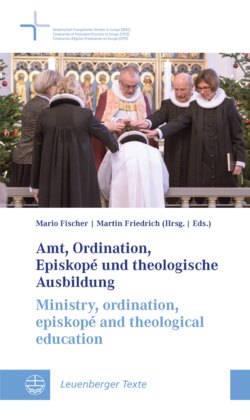Читать книгу Amt, Ordination, Episkopé und theologische Ausbildung / Ministry, ordination, episkopé and theological education - Группа авторов - Страница 21
1.5.2.2The criterion of conformity with reality
Оглавление28. Scripture testifies to the experiences of Israel, of the early church and of individual people with God. In their own life, Christians gain experiences with reality which they associate with the experiences of others in Scripture. We have to distinguish between experience in general and experiences of faith, which means that experiences of life are reinterpreted in the perspective of the gospel. Experience of faith is experience with experience or, by other words, experience with the Holy Scripture. First of all, therefore experience is a source and not a criterion of theology and doctrine of the church. Only as a secondary meaning does human experience become a theological criterion.
29. The criterion of conformity with reality relates to human experience in various ways. The churches of CPCE have gained different experiences throughout history which have found expression in their different traditions and confessions. Theological insights and developments and the different forms of the church and its ministries are embedded in different socio-cultural and political contexts. Moreover, the shaping of church structures and ministries in history and the present day has to be directed towards the practical possibilities given for the witness and service of the church in a particular historical situation. Here, however, a distinction must always be made between facticity and validity. The validity of a current state cannot be deduced from the mere fact that something exists or does not exist. Conformity with reality does not mean unquestioning adaptation to existing circumstances, though these can certainly be changed and shaped by one’s own responsibility.
30. The Tampere Theses already say: “The outer shape of the congregation and its services have always been characterised to a certain extent by the surrounding society. This was also the case with the early Church. The Church must always maintain the freedom to resist society for the sake of her service to the word. It is of particular importance to see to it that neither an inherited form of the church’s ministry, which mirrors a bygone social structure, nor an uncritical adaptation to the surrounding society become the standard for the structure and the exercise of the functions of the church’s ministry” (Thesis 6).
31. The shaping of the church and its ministries is to be understood as a constant task for which all members of the church, as holders of the priesthood of all believers, bear responsibility. But the foundation of the church and its mission (see above, no. 16) provide the criteria for the actual shaping of church structures and ministries. On this basis, the shape of the church has to be determined time and again within a hermeneutical circle. This circle brings together the interpretation of Scripture with a true and honest acceptance of reality. (This may include the recognition that our confessions serve as guiding principles in the interpretation of Scripture). The criterion of conformity with reality does not limit the criterion of conformity with Scripture, rather it is subordinate to it.
1Cf. Freedom is binding. Final Report of the 6th General Assembly of CPCE 2006, no. 4.1 (German original in: Gemeinschaft gestalten – Evangelisches Profil in Europa. Texte der 6. Vollversammlung der Gemeinschaft Evangelischer Kirchen in Europa – Leuenberger Kirchengemeinschaft – in Budapest, 12.–18. September 2006, ed. W. Hüffmeier, M. Friedrich, Frankfurt am Main 2007, p. 317; English version available in the CPCE head office.
2Allgemeines Priestertum, Ordination und Beauftragung nach evangelischem Verständnis (‘The Protestant Understanding of Universal Priesthood, Ordination and Commissioning’), Texte aus der VELKD 130/2004, and „Ordnungsgemäß berufen“. Eine Empfehlung der Bischofskonferenz der VELKD zur Berufung zu Wortverkündigung und Sakramentsverwaltung nach evangelischem Verständnis (‘Orderly called. A Recommendation of the Bishops‘ Conference of the United Evangelical Lutheran Church in Germany regarding the Protestant Understanding of Proclamation of the Word and Administration of the Sacraments’), Texte aus der VELKD 136/2006. – For the discussion of the pertaining issues see below, fn. 55.
3Full text in: Sacraments, Ministry, Ordination, p. 113–121; Theses 1–3 in CJC, p. 117–119.
4‚Leuenberg – Meissen – Porvoo. Models of Church Unity from the perspective of the Leuenberg Agreement‘ (German original in: Versöhnte Verschiedenheit – der Auftrag der evangelischen Kirchen in Europa. Texte der 5. Vollversammlung der Leuenberger Kirchengemeinschaft in Belfast, 19.–25. Juni 2001, ed. W. Hüffmeier, Ch.-R. Müller, Frankfurt a. M. 2003, p. 258–267). English version available in the CPCE head office.
5No. 2.5, English version available in the CPCE head office.
6The Resource Material has been sent to the CPCE churches together with the main document in 2010, but it has not been the object of commenting, and thus it has not been revised.
7Tampere Theses 6 and 7 try to discern the challenges of the ministry against the background of the 1980s. Much of the analysis is still valid (including the interrelation between the crisis of the general priesthood of all believers and “the crisis in the ministry”, p. 119), although it would need adaptation and emendation today.
8CJC, p. 104–105 (Introduction 1.4).
9Tampere Theses 3; cf. the quotes above, no. 10.
10A much more detailed consideration of the hermeneutics of Scripture and Confessions, including the relation between Scripture and tradition, is given in the doctrinal study Scripture, Confession, Church. Leuenberg Documents 14, 2013.
